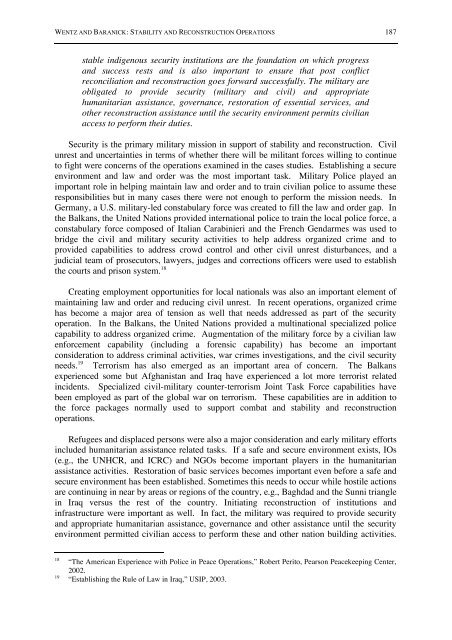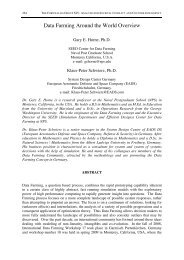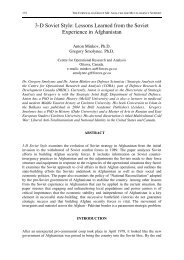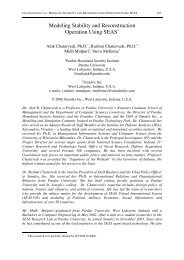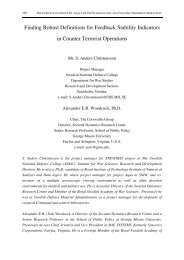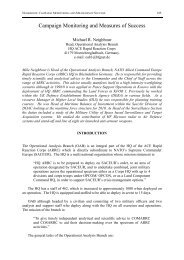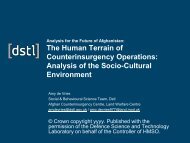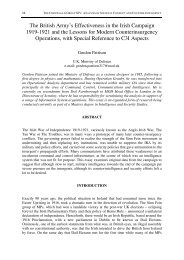Stability and Reconstruction Operations: What ... - Cornwallis Group
Stability and Reconstruction Operations: What ... - Cornwallis Group
Stability and Reconstruction Operations: What ... - Cornwallis Group
Create successful ePaper yourself
Turn your PDF publications into a flip-book with our unique Google optimized e-Paper software.
WENTZ AND BARANICK: STABILITY AND RECONSTRUCTION OPERATIONS 187<br />
stable indigenous security institutions are the foundation on which progress<br />
<strong>and</strong> success rests <strong>and</strong> is also important to ensure that post conflict<br />
reconciliation <strong>and</strong> reconstruction goes forward successfully. The military are<br />
obligated to provide security (military <strong>and</strong> civil) <strong>and</strong> appropriate<br />
humanitarian assistance, governance, restoration of essential services, <strong>and</strong><br />
other reconstruction assistance until the security environment permits civilian<br />
access to perform their duties.<br />
Security is the primary military mission in support of stability <strong>and</strong> reconstruction. Civil<br />
unrest <strong>and</strong> uncertainties in terms of whether there will be militant forces willing to continue<br />
to fight were concerns of the operations examined in the cases studies. Establishing a secure<br />
environment <strong>and</strong> law <strong>and</strong> order was the most important task. Military Police played an<br />
important role in helping maintain law <strong>and</strong> order <strong>and</strong> to train civilian police to assume these<br />
responsibilities but in many cases there were not enough to perform the mission needs. In<br />
Germany, a U.S. military-led constabulary force was created to fill the law <strong>and</strong> order gap. In<br />
the Balkans, the United Nations provided international police to train the local police force, a<br />
constabulary force composed of Italian Carabinieri <strong>and</strong> the French Gendarmes was used to<br />
bridge the civil <strong>and</strong> military security activities to help address organized crime <strong>and</strong> to<br />
provided capabilities to address crowd control <strong>and</strong> other civil unrest disturbances, <strong>and</strong> a<br />
judicial team of prosecutors, lawyers, judges <strong>and</strong> corrections officers were used to establish<br />
the courts <strong>and</strong> prison system. 18<br />
Creating employment opportunities for local nationals was also an important element of<br />
maintaining law <strong>and</strong> order <strong>and</strong> reducing civil unrest. In recent operations, organized crime<br />
has become a major area of tension as well that needs addressed as part of the security<br />
operation. In the Balkans, the United Nations provided a multinational specialized police<br />
capability to address organized crime. Augmentation of the military force by a civilian law<br />
enforcement capability (including a forensic capability) has become an important<br />
consideration to address criminal activities, war crimes investigations, <strong>and</strong> the civil security<br />
needs. 19 Terrorism has also emerged as an important area of concern. The Balkans<br />
experienced some but Afghanistan <strong>and</strong> Iraq have experienced a lot more terrorist related<br />
incidents. Specialized civil-military counter-terrorism Joint Task Force capabilities have<br />
been employed as part of the global war on terrorism. These capabilities are in addition to<br />
the force packages normally used to support combat <strong>and</strong> stability <strong>and</strong> reconstruction<br />
operations.<br />
Refugees <strong>and</strong> displaced persons were also a major consideration <strong>and</strong> early military efforts<br />
included humanitarian assistance related tasks. If a safe <strong>and</strong> secure environment exists, IOs<br />
(e.g., the UNHCR, <strong>and</strong> ICRC) <strong>and</strong> NGOs become important players in the humanitarian<br />
assistance activities. Restoration of basic services becomes important even before a safe <strong>and</strong><br />
secure environment has been established. Sometimes this needs to occur while hostile actions<br />
are continuing in near by areas or regions of the country, e.g., Baghdad <strong>and</strong> the Sunni triangle<br />
in Iraq versus the rest of the country. Initiating reconstruction of institutions <strong>and</strong><br />
infrastructure were important as well. In fact, the military was required to provide security<br />
<strong>and</strong> appropriate humanitarian assistance, governance <strong>and</strong> other assistance until the security<br />
environment permitted civilian access to perform these <strong>and</strong> other nation building activities.<br />
18<br />
19<br />
“The American Experience with Police in Peace <strong>Operations</strong>,” Robert Perito, Pearson Peacekeeping Center,<br />
2002.<br />
“Establishing the Rule of Law in Iraq,” USIP, 2003.


